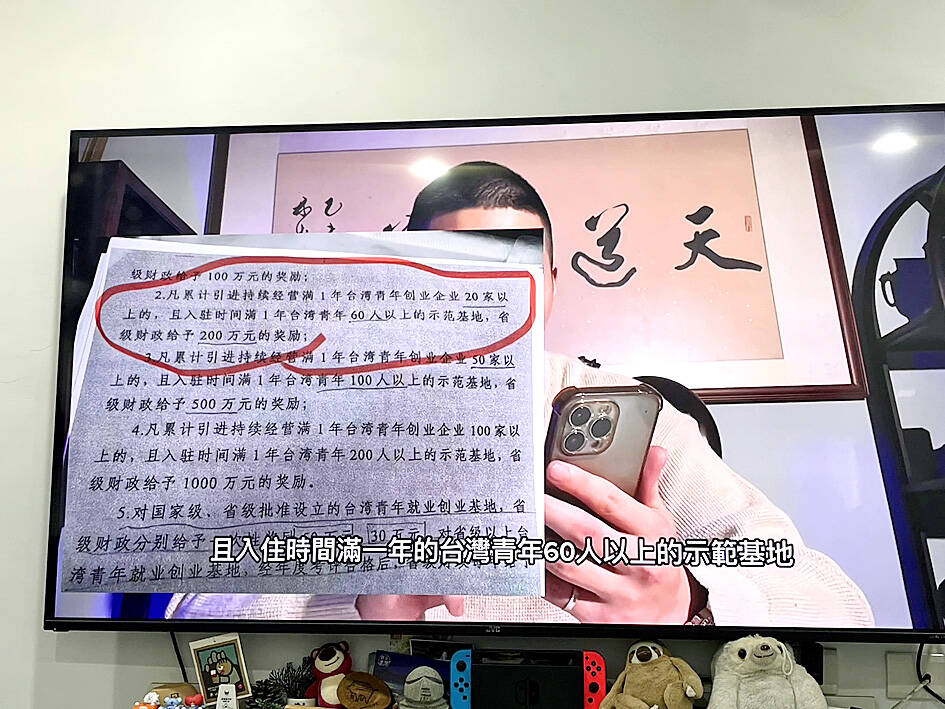Taiwanese rapper Chen Po-yuan (陳柏源) has revealed a document purported to be from within the Chinese Communist Party (CCP) describing a program to offer cash rewards to people who act as an intermediary to recruit Taiwanese to open businesses in China’s Fujian Province.
On Sunday night, Chen, whose stage name is Mannam PYC (閩南狼), posted a video on YouTube in which he described how Taiwan Youth Entrepreneurship Park head Lin Jincheng (林金城) allegedly earned up to 2 million yuan (US$273,418) by acting as an intermediary for the CCP to recruit Taiwanese for the park in Quanzhou in China’s Fujian Province.
The video is part of a series of videos that Chen and Taiwanese YouTuber Pa Chiung (八炯) have been releasing since last month on China’s “united front” tactics.

Photo: Screen grab from Chen Po-yuan’s YouTube channel
In one of the earlier videos, Lin told Pa and Chen that Taiwanese could apply for China’s national citizen identification card to register a company in the country and start a cross-border e-commerce business, purchase property or obtain bank loans.
In his latest video, Chen showed documents provided by Lin that detailed how a person could be rewarded for their recruiting efforts.
If a person recruited more than 20 businesses to open in Fujian and operate for at least a year, or if they convinced 60 Taiwanese to station at the park for a year, they would receive 2 million yuan.
If a person recruited 50 new businesses to the province or 100 or more people for the park, the bonus would increase to 5 million yuan.
In related news, a senior Taiwanese official said China’s efforts to entice more Taiwanese to get permits to live and work in China is prompting concern in Taipei that Beijing could be laying the groundwork to justify intervention in Taiwan’s affairs.
China’s efforts to promote the residence permit have intensified in the past few months, especially when it comes to targeting Taiwanese wo have never traveled to China, said the official, who asked not to be identified discussing a sensitive matter.
Taiwanese officials are concerned holders of the permit would be easier to convince to apply for a Chinese ID card and to swap their passports for those issued by Beijing, the official said.
They worry that could in turn be used by the Chinese government to justify the need to “protect Chinese citizens” in Taiwan, the official said.
In 2018, Beijing introduced the residence permit specifically for people from Taiwan, Hong Kong and Macau to make it easier for holders to live and work in China. The permit also grants access to financial services and social benefits, and can be obtained without those from Taiwan having to renounce their Taiwanese citizenship.

INVESTIGATION: The case is the latest instance of a DPP figure being implicated in an espionage network accused of allegedly leaking information to Chinese intelligence Democratic Progressive Party (DPP) member Ho Jen-chieh (何仁傑) was detained and held incommunicado yesterday on suspicion of spying for China during his tenure as assistant to then-minister of foreign affairs Joseph Wu (吳釗燮). The Taipei District Prosecutors’ Office said Ho was implicated during its investigation into alleged spying activities by former Presidential Office consultant Wu Shang-yu (吳尚雨). Prosecutors said there is reason to believe Ho breached the National Security Act (國家安全法) by leaking classified Ministry of Foreign Affairs information to Chinese intelligence. Following interrogation, prosecutors petitioned the Taipei District Court to detain Ho, citing concerns over potential collusion or tampering of evidence. The

Seventy percent of middle and elementary schools now conduct English classes entirely in English, the Ministry of Education said, as it encourages schools nationwide to adopt this practice Minister of Education (MOE) Cheng Ying-yao (鄭英耀) is scheduled to present a report on the government’s bilingual education policy to the Legislative Yuan’s Education and Culture Committee today. The report would outline strategies aimed at expanding access to education, reducing regional disparities and improving talent cultivation. Implementation of bilingual education policies has varied across local governments, occasionally drawing public criticism. For example, some schools have required teachers of non-English subjects to pass English proficiency

‘FORM OF PROTEST’: The German Institute Taipei said it was ‘shocked’ to see Nazi symbolism used in connection with political aims as it condemned the incident Sung Chien-liang (宋建樑), who led efforts to recall Democratic Progressive Party (DPP) Legislator Lee Kun-cheng (李坤城), was released on bail of NT$80,000 yesterday amid an outcry over a Nazi armband he wore to questioning the night before. Sung arrived at the New Taipei City District Prosecutors’ Office for questioning in a recall petition forgery case on Tuesday night wearing a red armband bearing a swastika, carrying a copy of Adolf Hitler’s Mein Kampf and giving a Nazi salute. Sung left the building at 1:15am without the armband and apparently covering the book with a coat. This is a serious international scandal and Chinese

TRADE: The premier pledged safeguards on ‘Made in Taiwan’ labeling, anti-dumping measures and stricter export controls to strengthen its position in trade talks Products labeled “made in Taiwan” must be genuinely made in Taiwan, Premier Cho Jung-tai (卓榮泰) said yesterday, vowing to enforce strict safeguards against “origin laundering” and initiate anti-dumping investigations to prevent China dumping its products in Taiwan. Cho made the remarks in a discussion session with representatives from industries in Kaohsiung. In response to the US government’s recent announcement of “reciprocal” tariffs on its trading partners, President William Lai (賴清德) and Cho last week began a series of consultations with industry leaders nationwide to gather feedback and address concerns. Taiwanese and US officials held a videoconference on Friday evening to discuss the